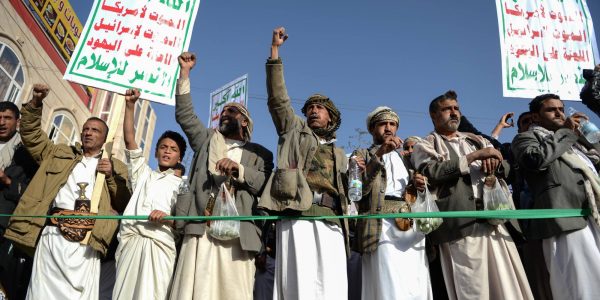
Houthis use terrorism as excuse to crack down on their opponents
Up until May 4, Shawfi Jaber Rafaan was known only the imam of the Kheir Mosque in the Dhamar province. He was neither wanted or being pursued by the Iran-backed Houthi militias, which had captured the area during their 2014 coup.
After his murder by a senior Houthi leader, Rafaan was labeled as a dangerous ISIS member, an accusation frequently used by the militias to stifle any uprising or opposition against them, said activists.
Rafaan was an imam at the Kheir mosque for several years. He also pursued religious studies at the Houthi-run Awqaf Ministry for five years. The Houthi overseer of the Atmeh province, however, charged that the imam had failed to adhere to his order to cease holding taraweeh prayers.
The Houthi overseer, known as al-Jarmouzi, led a group of Houthis, who stormed Rafaan’s peaceful village. They raided the mosque and shot dead the imam in a hail of bullets as he led taraweeh prayers.
Speculation was rife among villagers over what prompted the attack, with the suspicion that he was killed for refusing to stop holding taraweeh prayers holding the most weight.
The Houthis appeared helpless before angry villagers, whose only guilt is working hard to earn a living and avoid involvement in any political dispute. The Houthi official transported the cleric’s corpse to a hospital in Dhamar and kept it there until he could come up with a horrific enough justification for his crime that would deter and intimidate the people from rebelling.
He didn’t take long and used the same excuse the Houthis used against any social uprising against their oppression. The Houthi information ministry responded to widespread condemnation of the crime by claiming that the imam was one of the most dangerous ISIS members. It alleged that he was recruiting new members to the group in order to destabilize the province.
It went on to say that the cleric had for years trained criminals on how to build and plant bombs and that he was active in promoting takfiri ideology.
Ironically, just three days ago the Houthis released from jail 43 al-Qaeda members as part of a swap between the two groups. This was not the first such exchange. The Houthis had previously released dozens of dangerous terrorists in swaps throughout the conflict.
Source: Aawsat





